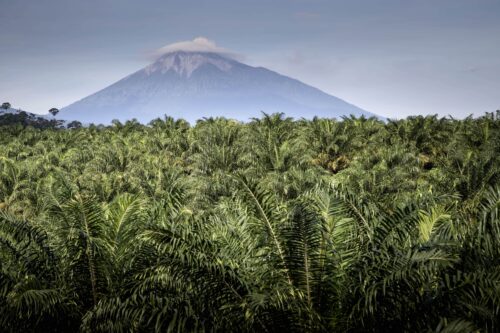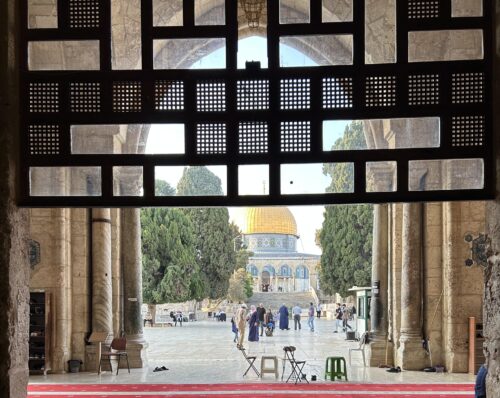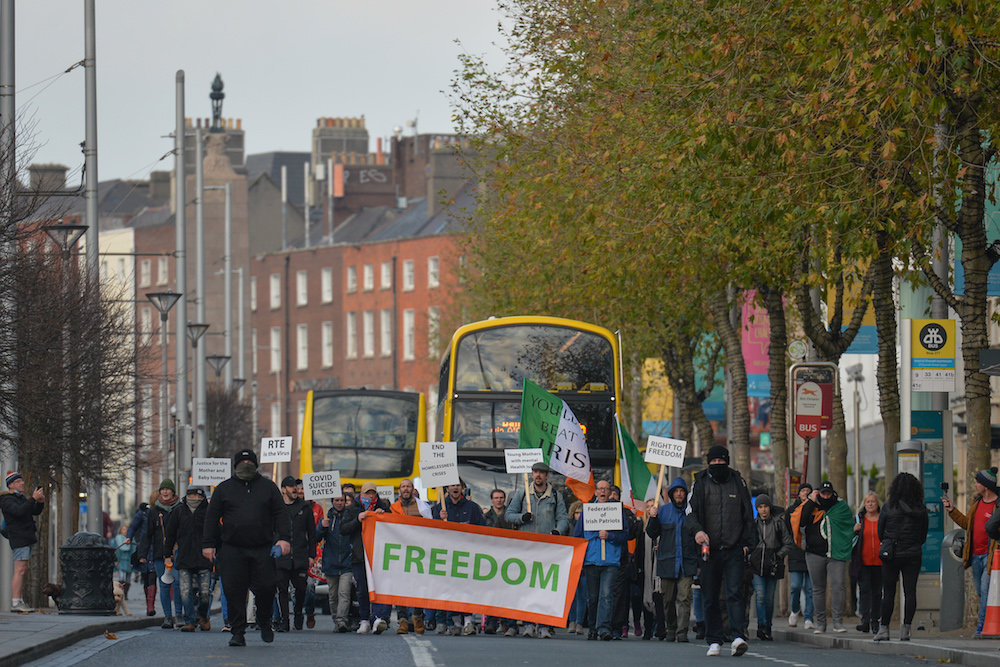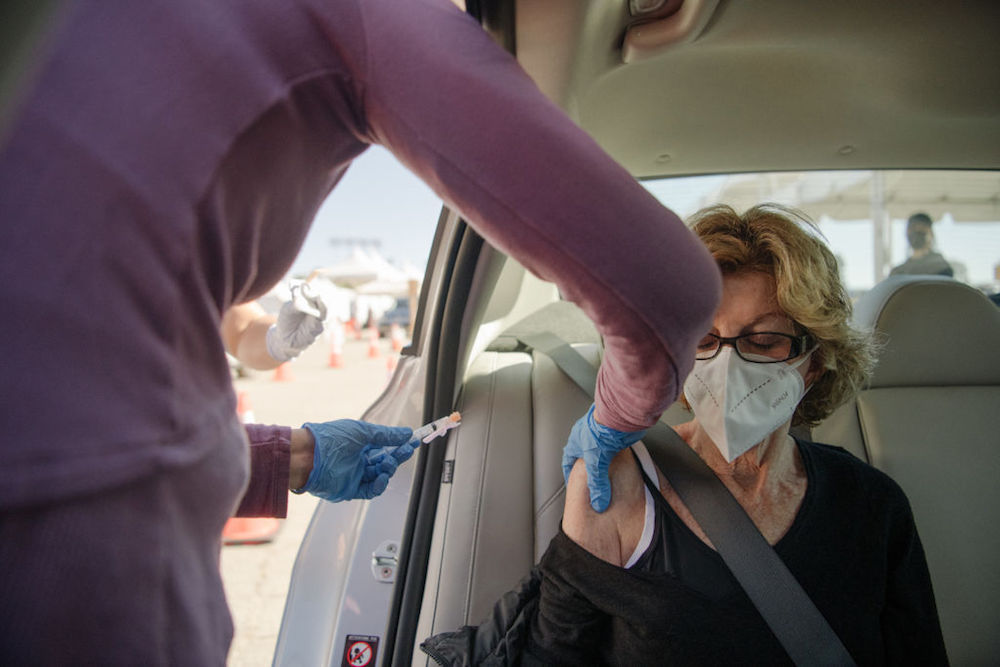What Does the American Dream Have to do With the COVID-19 Vaccine?
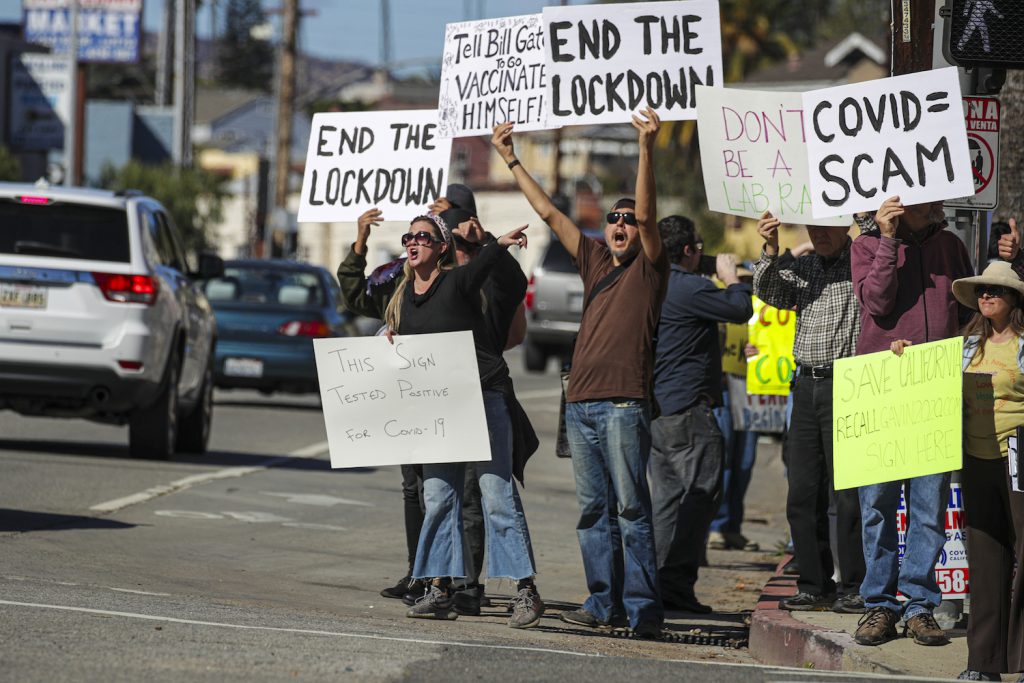
On January 30, protesters disrupted a mass COVID-19 vaccination clinic at Dodger Stadium in Los Angeles, a city hard-hit by the pandemic. Around 50 picketers attempted to pass out pamphlets and used bullhorns to share messages such as “You’re a lab rat” with people trying to get vaccinated. “Save Your Soul TURN BACK NOW” read a sign featured in that evening’s Los Angeles Times reportage.
The intrusion put older people and others who qualified for vaccination based on their vulnerability to COVID-19 into proximity with unmasked and censorious demonstrators. For safety’s sake—but much to the frustration of those who had been lined up for hours—authorities temporarily closed the site.
Vaccinations resumed quickly after demonstrators were dispersed, but the event provided a sharp reminder of the uphill battle against disinformation faced by public health experts and others seeking to end the pandemic. Given the pandemic’s devastating toll, and the excellent efficacy and safety records of the vaccines—which are in such high demand that a black market has developed—why are cynics still with us? How did things come to this?
To arrive at an answer, it helps to consider who in the U.S. has vaccination-related doubts, and why. For instance, some Black and Hispanic or Latinx people are notably hesitant when it comes to COVID-19 vaccines. This stems from a history of certain communities being exploited for unethical research, subjected to procedures without consent, and denied equitable health services. This heinous legacy combined with structural racism underwrites justifiable fears, with which the U.S. needs to grapple. But the protests at Dodger Stadium, despite purporting to speak truth to power, were not concerned with reparations of this kind.
Nor did they align with the stereotype of “anti-vaxxers” as wealthy liberals, including celebrities, touting false claims that vaccines cause autism. For the past few decades, vaccine dissenters have been typecast and ridiculed by some mainstream media outlets as left-leaning parents who favor alternative medicine, alternative schools, and expensive organic food. In this guise, vaccine dissent is written off as the purview of privileged idiots.
This problematic stereotype forecloses the possibility for productive communication between people with varied and valuable viewpoints. Further, it leaves many asking who was actually picketing at Dodger Stadium and whether we have entered a new era of anti-vaccination activity in the U.S. To this, I say yes—and no.
Concerns over control, authority, transparency, and freedom have always been central to U.S. vaccine dissent. Accordingly, many individuals uninterested in vaccination today are not liberal elites but fundamentalist homeschoolers, survivalists, and/or libertarians—all of whom value freedom from the state’s interference in people’s lives. Indeed, many who protest COVID-19 vaccines would replace the anti-vax label, and the extremism it implies, with a focus on self-determination. They see themselves as freedom fighters holding the line, on behalf of the (misinformed, too-docile) people, against vaccine-fueled enslavement by authoritarian states or (in some minds) a global regime.
I saw these attitudes while studying dissenting understandings—or what some call “conspiracy theories”—surrounding COVID-19 with my colleague Ela Drążkiewicz. Our project focused on Ireland, Poland, and the U.S., where many COVID-19 deniers, like many of today’s “anti-vaxxers,” worry that state-based health mandates such as mask-wearing disregard civil liberties. Ela and I tied the specifics of the various national discourses to localized complaints against these states. For example, in Ireland such worries gave voice to painful memories of brutal foreign rule and political divisions within the island; in Poland, they ultimately referenced the struggle against communism and the related assumption that true democracy cannot be realized in and by the state.
In the U.S., particularly among White people, COVID-19 conspiracy theories speak to lives lived in the wake of a crumbling American Dream of self-built prosperity and concerns regarding the freedoms meant to support it.
For White people in the U.S., mainstream culture holds that capitalism, done right, affords anyone who works hard access to “the good life.” But, as confirmed by the Brookings Institution, employment and wages for White males in the middle class have stagnated and, in some cases, declined in recent decades. In particular, White, blue-collar workers (men and women) have been hard hit by the U.S. manufacturing downturn. The notable uptick between 1999 and 2015 in suicides and drug- and alcohol-related deaths among White people who do not have a college degree, a demographic once favored for economic mobility if not stability, demonstrates this group’s pervasive despair about achieving the American Dream. Small business owners, too, are suffering nowadays due to pandemic-related closures. But rather than question the American Dream itself, which might mean having to give up on the prospect, some find it more satisfying to blame their lack of upward mobility or their precariousness on corporate and political elites and foreigners.
For example, some see public health efforts—including vaccine development and, now, distribution—as directly supportive of profits for Big Business, in whose shadow some say the government works. Suspicion regarding government intentions is nothing new, and some conspiracist assertions are, of course, anchored in reality. However, social media has propagated a tsunami of misinformation regarding COVID-19, spreading it quickly via networked platforms and intensifying its weight within various users’ mediaverses through self-reinforcing algorithms.
COVID-19 conspiracy theories speak to lives lived in the wake of a crumbling American Dream of self-built prosperity.
In some minds, state-backed corporations masterminded the curfews and closures to avoid competition from small businesses. In other perspectives, Big Pharma itself underwrote the creation and spread of COVID-19, or at least exaggerated its dangers, specifically to sell vaccines. Some say that Anthony Fauci, director of the National Institute of Allergy and Infectious Diseases, along with business magnate Bill Gates and others, invested in vaccines and so stand to profit immensely. Conjoined to this story is worry that vaccines will introduce into the body microchips to monitor the population and, in some renditions, sap free will.
These anxieties regarding state-backed corporate duplicity clearly show the handprints of QAnon, a far-right millennialist conspiracy cult. To wit, the Dodger Stadium protesters intended to march against not just COVID-19 vaccines but “against everything COVID,” according to a post on social media by organizers, including “Tests, Lockdowns, Masks, Fauci, Gates, Newsom, China, digital tracking, etc.”
This right-wing #FireFauci, “reopen America” mandate is ultimately broader and perhaps scarier to “the average American” than that of the narrower vaccination-rights contingent, and of the subgroup therein whose worries focus on the safety or ingredients of certain vaccines but who otherwise see vaccination as a public good. The Dodger Stadium protest organizers, knowing they needed to make a broad appeal, instructed marchers to “please refrain from wearing Trump/MAGA attire as we want our statement to resonate with the sheeple.”
Today’s vaccination dissent exhibits not just a public-facing dedication to misinformation evangelism, but a desire to stop vaccination itself. By contrast, parents who selectively vaccinated their children in the mid-2010s generally took a live-and-let-live perspective. Social norms influenced people’s decisions, but the focus was on preserving the right to opt out, not actively discouraging others from getting vaccinated.
Over the past few years, however, a small faction of California’s vaccine-concerned citizens has become aggressive. In 2019, for instance, as childhood vaccination exemption rules tightened and incivility in public life reportedly increased, activists threw blood at lawmakers in the California Capitol, and in a separate incident, a senator was shoved by a vaccine opponent. The arrival of COVID-19 has activists further emboldened: Two weeks prior to the Dodger Stadium demonstration, during the public comment time at a budget hearing, California’s leaders received veiled threats of gun violence should they support mass vaccination.
These attempts to foist beliefs upon others is in keeping with other right-wing efforts, including those of anti-abortion and QAnon activists. Acting as domestic terrorists, anti-abortion extremists have been responsible for numerous murders, bombings, and arson attacks at clinics in the U.S. and elsewhere. Core QAnon advocates have also been responsible for inciting and enacting violence.
Given that vaccination is just the tip of the iceberg of grievances raised by the Dodger Stadium protesters, is violence at mass vaccination sites far behind?
What the U.S. is seeing reflects both an infusion of energies from the extreme right into what were previously narrowly focused efforts to protest vaccines and the reciprocal absorption of many from the latter camp into a movement that is both broader and more sinister. The confluence of left and right in this emergent arena of vaccine dissent illustrates how today’s conspiracy theories can enchant multiple groups that valorize personal freedoms, self-determination, and anti-authoritarianism—sometimes prioritizing freedom for themselves over the social good writ large.
In this light, the world as seen through the Dodger Stadium dissenters’ lens is not wholly an alternate reality. It is the same world in which most Americans live, shaped by and reinforcing of the national value placed on “freedom.” Americans’ love for freedom, it turns out, blurs lines between left and right; it provides a driving common cause—one now attached in some imaginations with the vaccine against COVID-19.
And so, just as vaccine dissent cannot be cast simply as a blue or red position, it cannot be grasped as single-issue activism. It is a complex concern: one with ties to multiple infringements on and subversions of self-determination—both perceived, in the case of mask wearing, and real, as for many historically marginalized communities who harbor understandable distrust of the health system.
Given the January 6 security failure at the U.S. Capitol, presages of violence at earlier health-freedom protests, the increased enmeshment of hardcore conspiracist networks within health-concerned online communities, and the growing aggressiveness of vaccine freedom-focused advocates—we cannot discount what happened in Los Angeles as a one-off event.
Anticipating future “COVID=scam” demonstrations, authorities in Los Angeles aim to set up a “protest zone” at the stadium in the hope that it can keep dissenters at a safe distance while honoring their right to free speech. Although similar future protests may be small and few in number nationwide, other regional officials would do well to follow suit.
Meanwhile, those who support vaccination in the U.S. must work harder to discover a means to gainfully leverage COVID-19 vaccine protesters’ anger. Outreach efforts must acknowledge the ways in which COVID-19 conspiracy theories—while often counterfactual and dangerous—give voice to legitimate concerns with how state-supported capitalist interests have subverted opportunities to achieve the American Dream. And we must work to ensure, for all citizens, a path toward advancement.


























